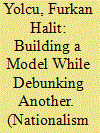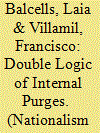|
|
|
Sort Order |
|
|
|
Items / Page
|
|
|
|
|
|
|
| Srl | Item |
| 1 |
ID:
174591


|
|
|
|
|
| Summary/Abstract |
The existing scholarship typically measures “Americanization” along structural lines—such as knowledge of public policies, percentage of life spent in the U.S., or proficiency in the English language. While these variables are certainly important, they overlook another important dimension of newcomers’ post-migration experiences—namely, immigrants’ psychological attachment and sense of belonging to the American social, political, and economic fabric. This article therefore reevaluates what it means to Americanize by exploring the psychological (or symbolic) dimensions of multigenerational immigrants’ evolving political beliefs toward the polity. In rethinking the process of Americanization, we rely on a largely understudied immigrant population—that is, the Los Angeles Armenians (or Armenian Angelenos)—and an original public opinion survey—the Armenian Angeleno Survey (AAS). This study demonstrates that symbolic (rather than merely structural) Americanization is a useful framework in studying how contemporary immigrant groups position themselves in relation to the polity and understand important political outcomes. This article thus introduces an expanded model based on how multigenerational immigrants cultivate their ethnic communities while becoming ideological members of American society.
|
|
|
|
|
|
|
|
|
|
|
|
|
|
|
|
| 2 |
ID:
174596


|
|
|
|
|
| Summary/Abstract |
The decade of 1950–60 was unique in terms of the establishment of a supranational Arab union, known as the United Arab Republic. However, this union was ill born due to certain frictions between Arab states in the Middle East. There were divergences between the visions of Arab Nationalism for each state and this caused a troubling process for this supranational initiative. This study considers these frictions as the main reasons behind why the UAR was an unsuccessful attempt and further why the Arab Nationalism dissolved afterwards. The divergence between two competing visions of Arab Nationalism is symbolized through the competition between Iraqi prime minister Abd al-Karim Qasim and Egyptian president Gamal Nasser. The domestic, regional and global circumstances for these two countries and their leaders are analyzed in order to illustrate how these frictions became a reality and divided the Arab stance.
|
|
|
|
|
|
|
|
|
|
|
|
|
|
|
|
| 3 |
ID:
174593


|
|
|
|
|
| Summary/Abstract |
States often engage in internal purges to eliminate political dissidents within their own ranks. However, partly because of the absence of reliable data, we know little about the logic and dynamics of these purges, particularly of lower-rank members of the state. Why do state authorities persecute these individuals when they do not entail a clear threat to the regime? We focus on the purges of public-school teachers during the early years of Francisco Franco’s regime in Spain. Using detailed historical sources, we explore whether teachers were more likely to be purged following the two main cleavages in 1930s Spain: the left-right divide and the center-periphery (i.e., nationalist) cleavage. Our results suggest that while the Spanish Civil War (1936–1939) was still unfolding Francoist authorities targeted mainly teachers from leftist localities, thus focusing on potential security threats behind the frontlines. After winning the war, Francoists started to target more intensively teachers from national minority groups in order to promote nation-building policies leading to their assimilation. Our findings highlight the double logic of purging as both a preemptive measure against internal threats and as a nation-building tool.
|
|
|
|
|
|
|
|
|
|
|
|
|
|
|
|
| 4 |
ID:
174592


|
|
|
|
|
| Summary/Abstract |
In this paper we empirically reexamine the debate over the conflict reducing properties of inclusive political institutions. We examine the purported violence reducing effects of proportional representation (PR) electoral systems, parliamentarism, and federalism, conditioning their effects on ethnic fractionalization and whether a country is conflict prone. In other words, are these institutions more effective in countries that have already experienced major conflict or are they more effective in preventing conflict in countries that have not experienced major conflict? Using a data set that includes a sample of 81 countries and 2488 observations from 1973 to 2018, we test the conditional effects of proportional representation electoral systems, parliamentarism and federalism conditioning these by ethnicity and whether the country has experienced a major conflict (i.e., civil war). We find that these institutions have little effect on reducing the number of riots or political deaths, but PR electoral systems reduces ethnic violence when ethnic fractionalization is high. On the other hand PR electoral systems and parliamentarism reduce ethnic violence in conflict prone countries, but federalism increases the likelihood of ethnic violence. We discuss the implications of these findings with regard to arguments regarding inclusive power sharing arrangements and violence in post conflict environments.
|
|
|
|
|
|
|
|
|
|
|
|
|
|
|
|
| 5 |
ID:
174595


|
|
|
|
|
| Summary/Abstract |
This paper examines the factors influencing the support for Russia’s Ukraine policy. Western sanctions imposed on Russia have crippled its economy and the general well-being of its people. However, support for Moscow’s Ukraine policy remains firm among the Russian population, who believe that the West has malevolent intentions toward Russia. The Russian elite has skillfully utilized identity politics for national consolidation and to mobilize support for its Ukraine policy by manipulating Russian history, beliefs, and worldviews. Russians see themselves as righteous people who are highly capable of dealing with difficulties and certainly as winners in the conflict with the West.
|
|
|
|
|
|
|
|
|
|
|
|
|
|
|
|
| 6 |
ID:
174594


|
|
|
|
|
| Summary/Abstract |
National-populist parties display a discourse based on the defense of the national integrity. However, in the current European context, these parties have to deal with an increasing cultural heterogeneity, new forms of citizenship, and multi-scaling arenas. How does national-populism develop its narratives in these settings? The paper elaborates a framework for understanding the way in which ambiguity is included in the discursive strategies of national-populists. Through the Critical Discourse Analysis approach, the contribution will focus on the analysis of the discourses produced by three parties located at the Swiss-Italian border at the time of the referendum campaign for the 2014 Swiss initiative “Against Mass Immigration.”
|
|
|
|
|
|
|
|
|
|
|
|
|
|
|
|
|
|
|
|
|